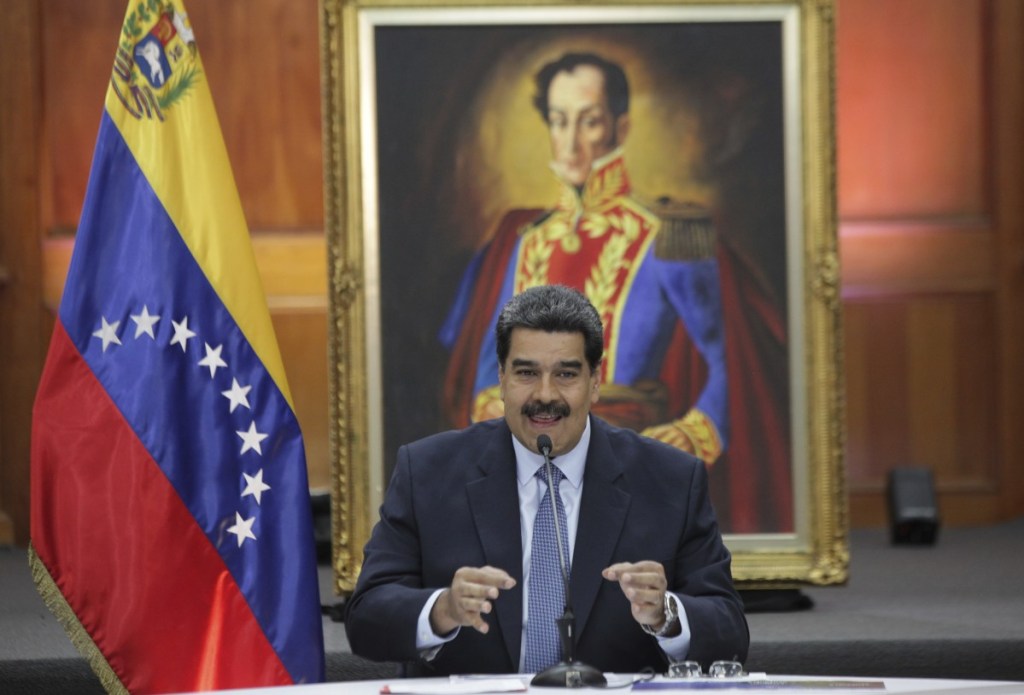The power struggle in Venezuela between President Nicolas Maduro and the opposition-controlled National Assembly intensified dramatically this week when assembly leader Juan Guaido declared himself the country’s legitimate president. But regardless of what one thinks about the merits of Guaido’s claim or the rightness of his cause, the long history of U.S. intervention in Latin America complicates the uprising he’s leading against the fraudulently elected Maduro.
As recently as a year and a half ago, President Donald Trump publicly mulled “a possible military option” to oust Maduro. And just a day before Guaido claimed power, Vice President Mike Pence wrote in the Wall Street Journal that the U.S. “strongly supports the National Assembly and Mr. Guaido” and that Maduro “has no legitimate claim to power.” So the administration’s stunningly swift recognition on Wednesday of Guaido as Venezuela’s legitimate president was hardly surprising.
Nevertheless, it is worrisome, given the long memory of American involvement in coups and regime change in the region — especially if the primary U.S. goal is (as it should be) restoring legitimate and democratically elected government to the oil-rich but deeply troubled nation.
More than 50 countries refused to recognize Maduro’s election last year, and more than 20 recognized Guaido after he declared Venezuela’s presidency vacant and stepped in to fill it. Under the Venezuelan constitution, the head of the assembly takes over in the event that the presidency is unoccupied.
But the presidency is not vacant, notwithstanding Maduro’s illegal hold on power in the wake of the May 20, 2018, show election. Make no mistake — Maduro is a disaster for his nation and for democracy and must go. Guaido and tens of thousands of Venezuelan demonstrators are to be congratulated for trying to take their country back.
But the army still backs Maduro, as does a loyal portion of Venezuela’s impoverished population. So a certain deftness in international diplomacy could well make the difference between the country making a successful transition to an interim government, with democratic elections to follow, or it descending into a bloody civil war.
The Trump administration, unfortunately, lacks any kind of deftness in diplomacy.
That’s a serious problem. The U.S. is an essential — yet often toxic — presence in South America. Maduro, just like his predecessor Hugo Chavez, clings to power in part by framing himself as an opponent of an imperial America that overthrew a succession of governments in the region. A failed 2002 coup against Chavez that some experts linked to the administration of President George W. Bush — although Bush denied involvement — cemented Chavez’s popular support and began the long chain of economic and governmental disasters that led to nearly 10 percent of Venezuelans leaving their country.
Maduro came to power after Chavez’s death in 2013, inheriting an economy that was collapsing under the weight of governmental corruption and mismanagement. He won control of the nation’s supreme court, and through it, dissolved the National Assembly in 2017 and replaced it with a “constituent assembly” that he controls. In the meantime, he exacerbated the country’s economic problems by printing money, stoking a hyperinflation that has devoured the value of Venezuela’s currency.
As a result, Venezuela — once numbered among the continent’s wealthiest nations — now has one of the world’s most crippled economies. Its rate of inflation, the International Monetary Fund estimates, is close to 10 million percent. Its oil industry has virtually collapsed. Hunger and disease are rampant. Democratic institutions — official ones, anyway — are gone.
But the National Assembly, although unofficial, persists. And Guaido is its duly elected leader.
Rather than immediately recognize Guaido as president and risk tainting him as an American puppet, though, a better move for Trump would have been to respond as did the leaders of most European countries: salute Venezuelans for standing up for democracy, support the National Assembly, keep their sabers in their sheaths and stand ready to offer help, whether that means offering Maduro a plane ride out of the country, promising assistance with post-Maduro elections or extending badly needed funding and expertise to get the economy back on track. Or all three.
As it is, the U.S. now finds itself in a war of words with Russia, which supports Maduro — as does China.
The world watches nervously, but with some hope. A people-power uprising against an illegitimate and abusive government has moral authority and, potentially, staying power. Outside military intervention of the sort Trump discussed in 2017, on the other hand, would keep the cycle of dysfunction and misery intact.
Editorial by the Los Angeles Times
Visit the Los Angeles Times at www.latimes.com
Distributed by Tribune Content Agency, LLC.
Copy the Story LinkSend questions/comments to the editors.



Success. Please wait for the page to reload. If the page does not reload within 5 seconds, please refresh the page.
Enter your email and password to access comments.
Hi, to comment on stories you must . This profile is in addition to your subscription and website login.
Already have a commenting profile? .
Invalid username/password.
Please check your email to confirm and complete your registration.
Only subscribers are eligible to post comments. Please subscribe or login first for digital access. Here’s why.
Use the form below to reset your password. When you've submitted your account email, we will send an email with a reset code.